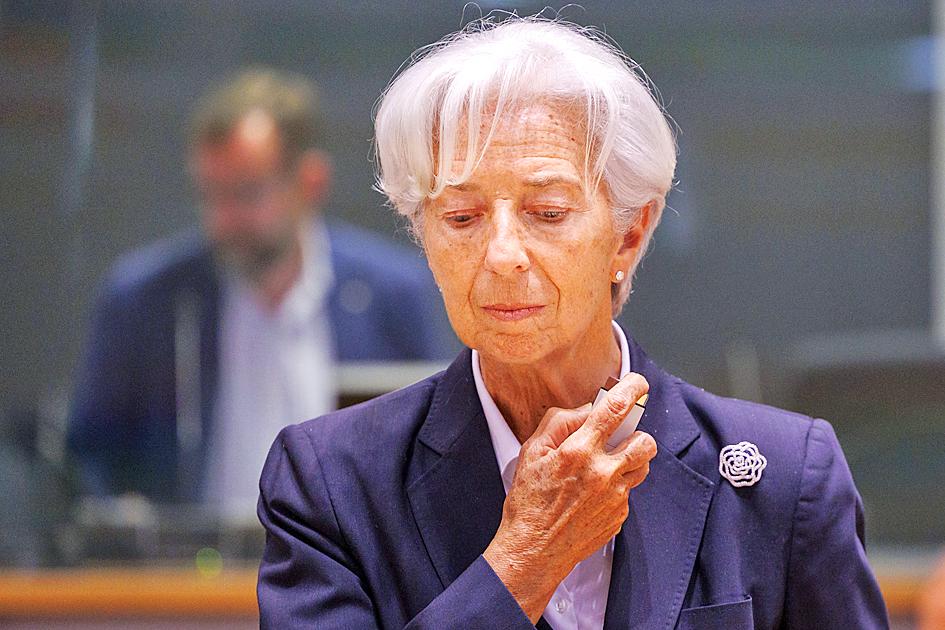The European Central Bank (ECB) would not be rushed into withdrawing monetary stimulus as officials act to contain inflation running at almost four times their 2 percent target, ECB President Christine Lagarde said.
“I don’t think that we’re in a situation of surging demand at the moment,” she told Francine Lacqua on Bloomberg Television from the World Economic Forum in Davos, Switzerland, yesterday.
“It’s definitely an inflation that is fueled by the supply side of the economy. In that situation, we have to move in the right direction, obviously, but we don’t have to rush and we don’t have to panic,” she said.

Photo: AP
Lagarde spoke a day after laying out her vision for the central bank’s next steps in a blog post.
The ECB is likely to exit negative monetary policy by the end of the third quarter, with a first interest-rate increase set for July, she said.
That prospective timetable signaling two quarter-point interest-rate hikes in the third quarter has irked some colleagues, because it would effectively exclude moving with a half-point increment, according to people familiar with the matter.
Some officials, including Bank of France Governor Francois Villeroy de Galhau, have also suggested that the ECB might end the year with positive interest rates. Traders are wagering on four 25-basis-point hikes by the ECB by the end of this year.
“When you’re out of negative, you can be at zero, you can be slightly above zero,” Lagarde said. “This is something we will determine on the basis of our projections, on the basis of our forward guidance.”
Lagarde refused to be drawn on whether the central bank might consider a 50 basis-point move.
Policymakers are walking a fine line as Russia’s invasion of Ukraine sent prices surging while denting confidence among businesses and households. New COVID-19 restrictions in China are putting additional strains on supply chains.
However, the ECB president downplayed the risk of an economic contraction, saying “for the moment, we are not seeing a recession in the euro area.”
She cited unemployment “at rock-bottom rates,” large household savings and the prospect for a strong summer for the tourism industry as forces that would offset negative shocks from the war and record inflation.

KEEPING UP: The acquisition of a cleanroom in Taiwan would enable Micron to increase production in a market where demand continues to outpace supply, a Micron official said Micron Technology Inc has signed a letter of intent to buy a fabrication site in Taiwan from Powerchip Semiconductor Manufacturing Corp (力積電) for US$1.8 billion to expand its production of memory chips. Micron would take control of the P5 site in Miaoli County’s Tongluo Township (銅鑼) and plans to ramp up DRAM production in phases after the transaction closes in the second quarter, the company said in a statement on Saturday. The acquisition includes an existing 12 inch fab cleanroom of 27,871m2 and would further position Micron to address growing global demand for memory solutions, the company said. Micron expects the transaction to

Nvidia Corp’s GB300 platform is expected to account for 70 to 80 percent of global artificial intelligence (AI) server rack shipments this year, while adoption of its next-generation Vera Rubin 200 platform is to gradually gain momentum after the third quarter of the year, TrendForce Corp (集邦科技) said. Servers based on Nvidia’s GB300 chips entered mass production last quarter and they are expected to become the mainstay models for Taiwanese server manufacturers this year, Trendforce analyst Frank Kung (龔明德) said in an interview. This year is expected to be a breakout year for AI servers based on a variety of chips, as

Global semiconductor stocks advanced yesterday, as comments by Nvidia Corp chief executive officer Jensen Huang (黃仁勳) at Davos, Switzerland, helped reinforce investor enthusiasm for artificial intelligence (AI). Samsung Electronics Co gained as much as 5 percent to an all-time high, helping drive South Korea’s benchmark KOSPI above 5,000 for the first time. That came after the Philadelphia Semiconductor Index rose more than 3 percent to a fresh record on Wednesday, with a boost from Nvidia. The gains came amid broad risk-on trade after US President Donald Trump withdrew his threat of tariffs on some European nations over backing for Greenland. Huang further

HSBC Bank Taiwan Ltd (匯豐台灣商銀) and the Taiwan High Prosecutors Office recently signed a memorandum of understanding (MOU) to enhance cooperation on the suspicious transaction analysis mechanism. This landmark agreement makes HSBC the first foreign bank in Taiwan to establish such a partnership with the High Prosecutors Office, underscoring its commitment to active anti-fraud initiatives, financial inclusion, and the “Treating Customers Fairly” principle. Through this deep public-private collaboration, both parties aim to co-create a secure financial ecosystem via early warning detection and precise fraud prevention technologies. At the signing ceremony, HSBC Taiwan CEO and head of banking Adam Chen (陳志堅)